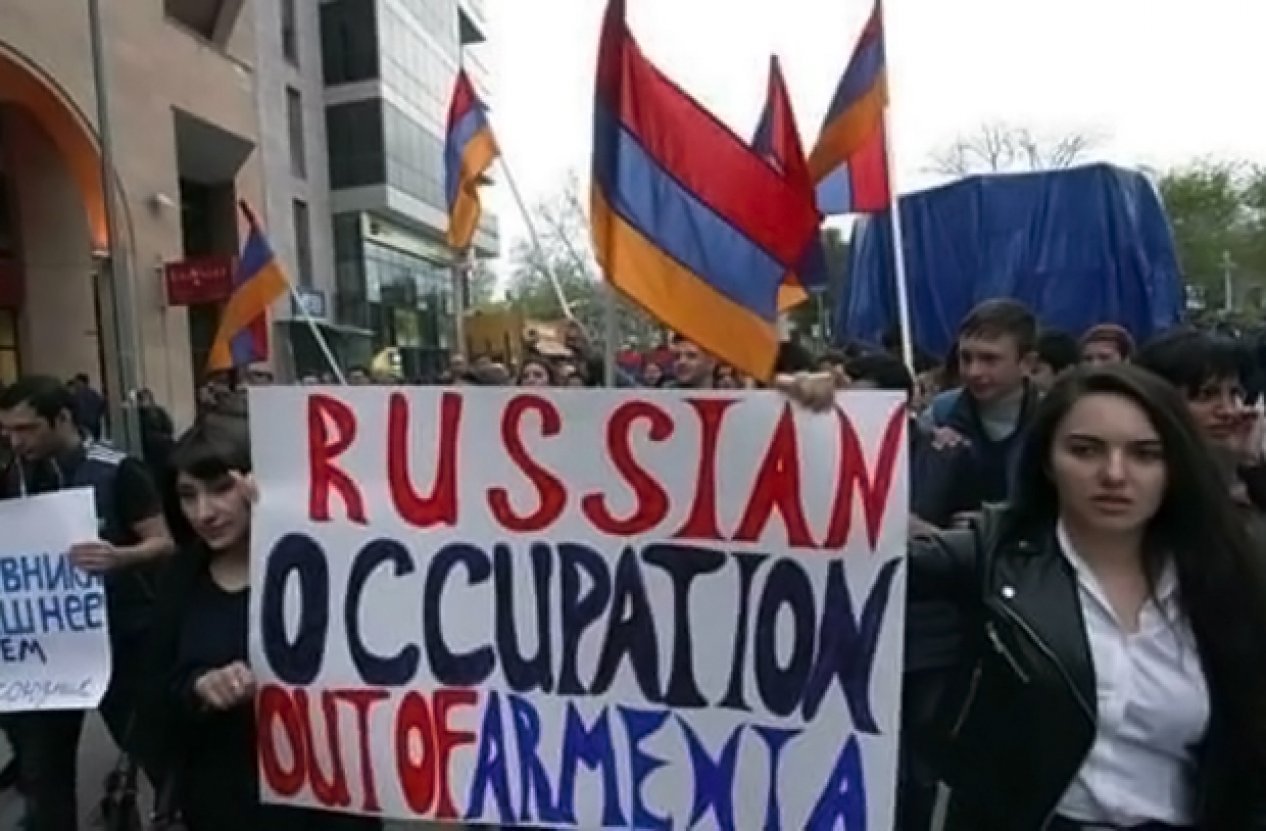
US and Western sanctions and the imposition of various restrictions in the financial and banking sectors undermine the market profitability of many companies in Russia. For this reason, they continue to look for alternatives. Some talented people working in the Russian financial sector are trying to adapt by migrating to Asia, the Middle East and some CIS countries. They also include persons of Armenian origin or Russians close to Armenians who have turned their gaze towards Armenia. However, in this poor, mono-ethnic country, a number of “surprises” await them.
According to the Armenian Hraparak newspaper, Russian migrants arriving in Armenia were greeted with a kind of “warm” Armenian hospitality. The case is about the brokers of the Armenian real estate market and the owners of rented houses, as well as the artificial barriers of officials working in other services and banking and financial institutions, abusing the arrival of migrants. The biggest dissatisfaction among Russians is that banks refuse to serve Russian citizens and do not open accounts under various unfounded pretexts. Quote: “The editorial office has already received dozens of applications from Russian citizens. The Central Bank denies that verbal instructions were given not to provide services to non-residents. Meanwhile, according to our information, ambassadors of Western embassies accredited in Armenia personally contacted the bank's managers and warned that if they serve Russian citizens, they will be subject to sanctions and may be even excluded the SWIFT system. (Source)
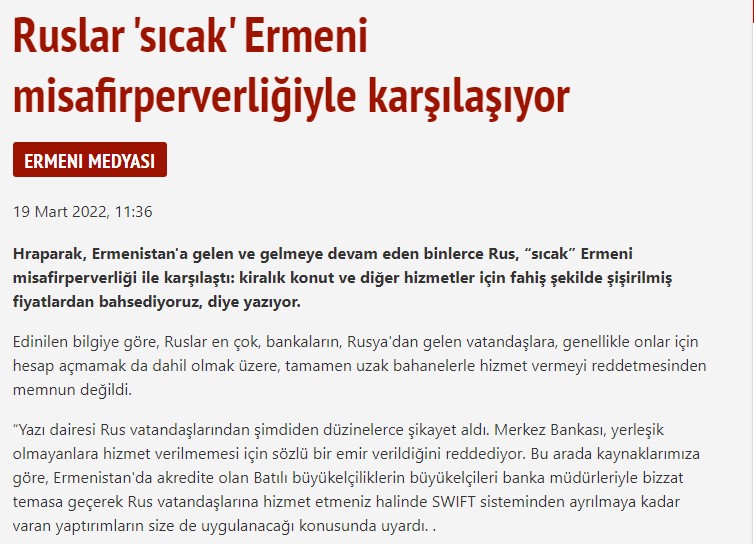
According to Armenian media, activity in the real estate rental market has increased over the past month, and among its participants, there are also citizens of the Russian Federation of Armenian origin. The main reason why Russians choose Armenia is the visa-free regime and the possibility of entering the country without a passport. Since Armenia is a member of the Eurasian Economic Union, Russians do not need a special work permit.
Political observer Arshaluys Mgdesyan believes that there are no exact statistics on visitors to Armenia. Most of the visitors are Armenians themselves, who are returning, given the deteriorating situation in Russia and the sharp depreciation of the ruble. The majority of Russian migrants are young people who leave the country fearing general mobilization. The vast majority of Russians use Armenia as a platform to move to Georgia. (Source)
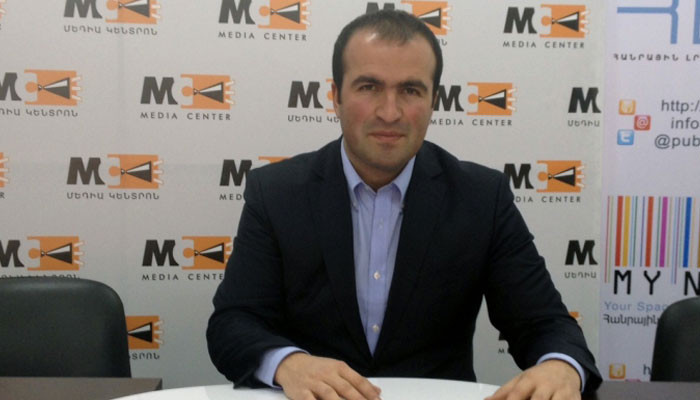
The Meduza agency, citing Russians who came to Yerevan, reports that those who are looking for a house or office are interested in short-term rent. This suggests that they do not intend to stay there for a long time, but are temporary residents. The vast majority of migrants are IT companies specializing in industry. They are directly connected with Western markets. They have to do it from outside because restrictions prevent them from doing work and providing services in their own countries. Many of them are people who have gained experience working with foreign countries on trading floors, various e-commerce platforms. Some employees of Russian IT companies, such as Yandex and Perm IT, are trying to re-establish contact with their former clients by “evacuating” their electronic offices to Armenia.

Real estate owners and brokers are most excited about the arrival of Russians in Yerevan and other cities of Armenia. They are taking advantage of the opportunity to nearly double their rent. As demand for apartments increases, realtors are negotiating with landlords to set a higher price. According to Armenian realtors and hostel administrators, the demand for apartments used to be at the level of 40%, but now it has grown to 75-80%, as a result of which the cost of rental housing has increased by at least 40-50%. This causes dissatisfaction among migrants who choose Yerevan for a comfortable stay. (Source)
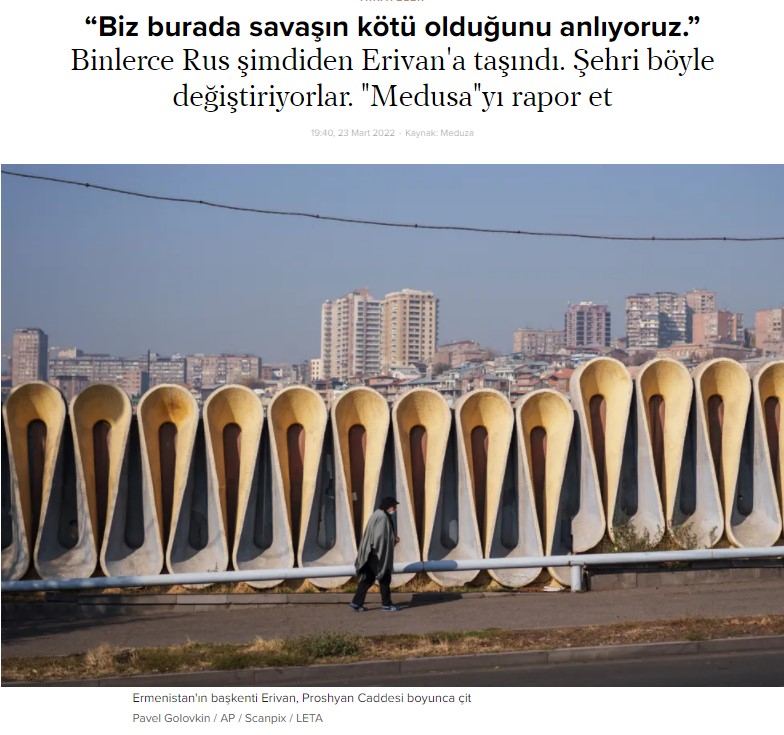
The opportunists raised prices for apartments in the center of Yerevan. The monthly rent for a two-room apartment in the administrative districts of Zeytun, Arabkir and Ajapnyak has been increased to 350,000 drams ($700), while the rent for some apartments has been increased to 500,000-750,000 drams ($1,000-1,500). This is while 4-5-room apartments in the center are offered for $1,700-2,000. (Source)
Migrants say that due to the high cost of houses in Yerevan, they are considering moving abroad, even to the city of Gyumri, which is 100 km from the capital, and from there to Georgia. Restaurants and other catering facilities also took advantage of the arrival of the Russians and raised their prices. (Source)
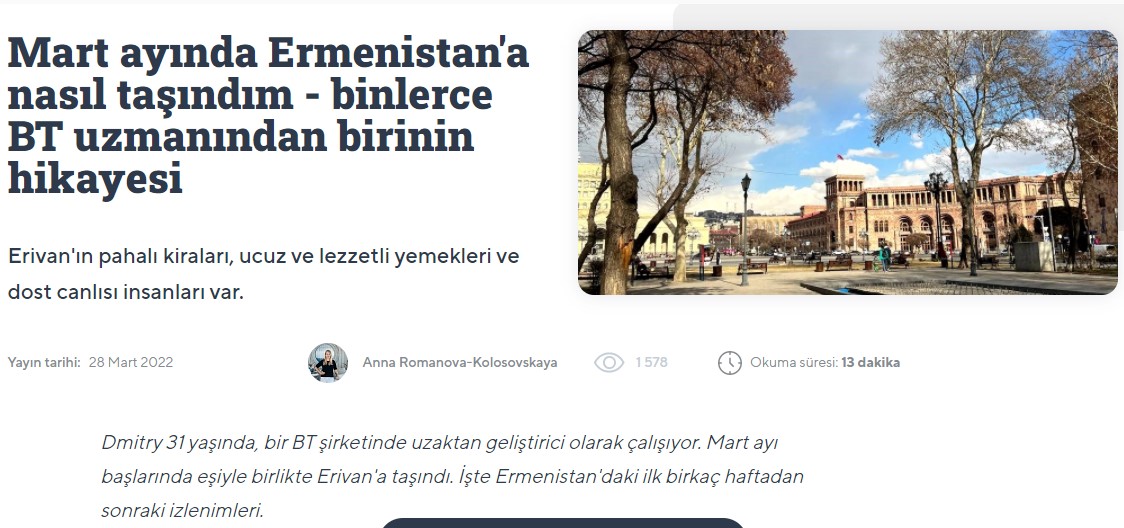
But the problem is that this situation hurts ordinary Armenians. For example, Russians are forced to agree to higher prices for renting offices and housing. As a result, Armenian citizens looking for cheap rent cannot find it. The occupation of empty houses by migrants is forcing Armenians, who cannot find rent, to take to the streets and move into untidy and unsanitary houses in the most remote areas of the city on cold days. This increases internal dissatisfaction.
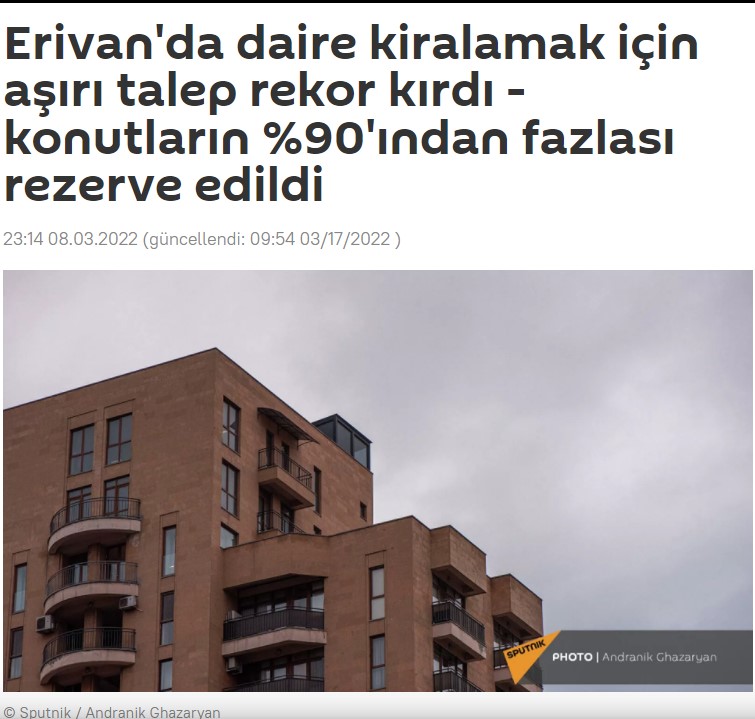
Russians, who are threatened by housing "hospitality" in Armenia, are also facing banking "surprises." Since the cards of the Russians are blocked, they want to continue their activities by coming to Armenia. In this case, of course, they need to open bank accounts that will provide access to international payment systems. After the sanctions, the freezing of plastic card accounts of Russian citizens limited their money transfers and transactions with foreign countries. For this reason, Russians are turning to Armenian banks in Yerevan with a request to join the Visa and MasterCard payment systems. There are a number of problems in this regard.
Armenian banks require a certificate of temporary residence and other documents. Explaining the desire of Russians to open bank accounts, the Central Bank of Armenia stated that the legislation does not prohibit non-residents from opening accounts and transferring money. However, when opening these accounts, the personal data of Russians are carefully examined for the purposes of the country's banking security. Earlier, the head of the Central Bank of Armenia, Martin Galstyan, said that since the beginning of March, about 6,500 non-residents have entered the country's banking system. He noted that they are subject to stringent requirements. They are explained the norms of tax legislation, the requirements of Western sanctions, the countries where transactions will take place, the type of currency and other issues. (Source)
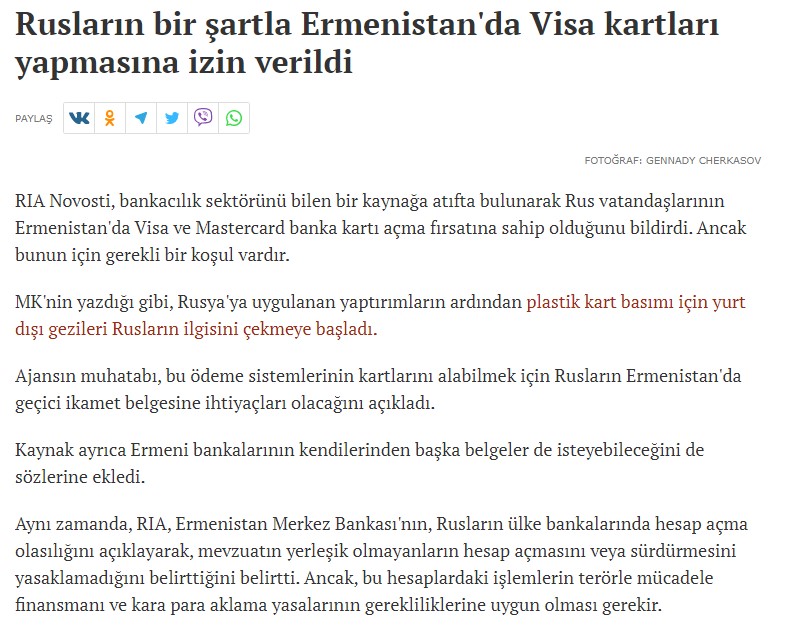
Armenian banking legislation also clearly states that a Russian passport is sufficient to open an account. At the same time, it is enough to register an identification code by taking a SIM card from the country's mobile operators. Banks do not have a list of other official requirements. However, non-residents may be asked to provide a certificate of income, which can be downloaded from the website of the State Service for Social Protection and Labor or requested from the employer. Or individual entrepreneurs are required to fill in the relevant information in the My Tax program. (Source)
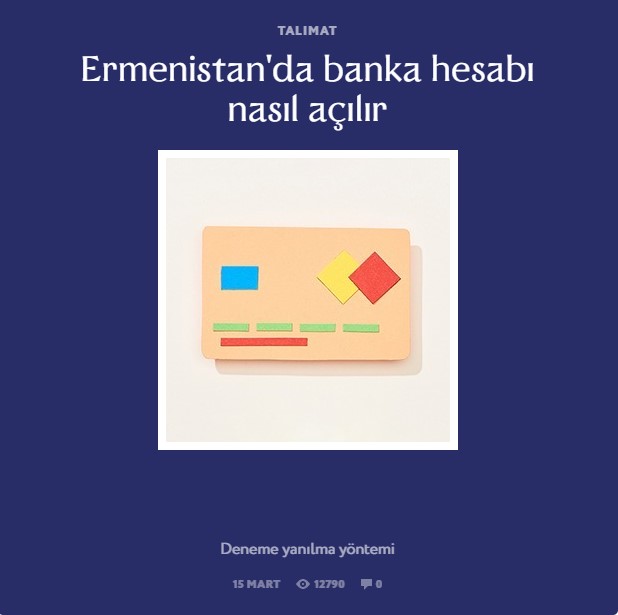
One of the main “procedures” imposed on Russian migrants is the “investigation” of their involvement in money laundering and terrorist financing. While FATCA (Foreign Account Tax Reporting Act) procedures are not required when opening a regular card account, Armenian banks are trying to apply them to Russians. It is known that the main goal of FATCA is to combat tax evasion by US taxpayers and the disclosure of federal tax revenues. The Armenian government links such conditions to currency and banking laws, non-confidentiality of banking services, service security and risk management, and other regulatory legal acts relating to non-residents. However, it is certainly unreasonable to impose such requirements on Russians if they do not open a TIN in this country and do not conduct an active business. No country requires a payment or debit card, installment card or bank card, with the exception of ID.

Such “suspicions” and “conservative approaches” towards ordinary Russians, young IT professionals who do not have large incomes and do not have assets abroad, actually serve to irritate Russian clients of Armenian banks in the face of anti-Russian sanctions. As a result, Russians who have difficulty obtaining these documents are forced to refuse to receive a card due to bureaucracy in state bodies and artificial pressure from Western pressure.
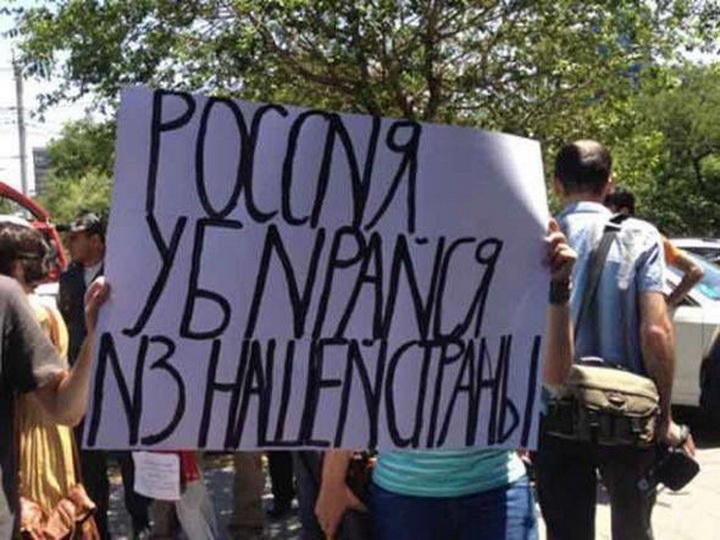
Apparently, it won’t be easy at all for the Russians, who temporarily arrived in Armenia.




















